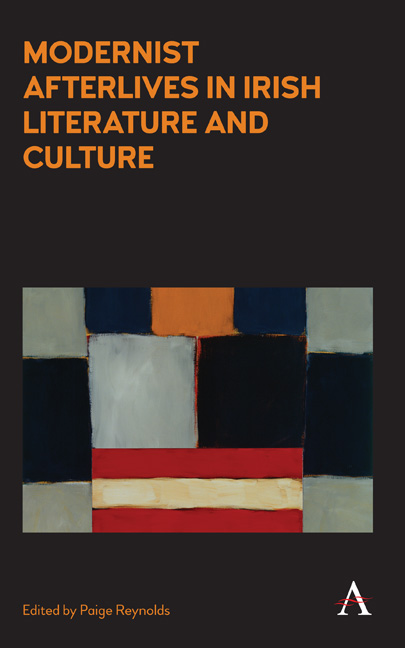Book contents
- Frontmatter
- Contents
- List of Figures
- Acknowledgements
- Introduction
- Section One LITERATURE AND LANGUAGE
- Chapter 1 ‘A World of Hotels and Gaols’: Women Novelists and the Spaces of Irish Modernism, 1930–32
- Chapter 2 ‘I Knew What It Meant / Not to Be at All’: Death and the (Modernist) Afterlife in the Work of Irish Women Poets of the 1940s
- Chapter 3 ‘Whatever Is Given / Can Always Be Reimagined’: Seamus Heaney's Indefinite Modernism
- Chapter 4 James Joyce and the Lives of Edna O'Brien
- Chapter 5 Modernist Topoi and Late Modernist Praxis in Recent Irish Poetry (with Special Reference to the Work of David Lloyd)
- Chapter 6 ‘Amach Leis!’ (Out with It!): Modernist Inheritances in Micheál Ó Conghaile's ‘Athair’ (‘Father’)
- Section Two INSTITUTIONS, ART AND PERFORMANCE
- Afterword: The Poetics of Perpetuation
- Notes on Contributors
- Index
Chapter 1 - ‘A World of Hotels and Gaols’: Women Novelists and the Spaces of Irish Modernism, 1930–32
from Section One - LITERATURE AND LANGUAGE
Published online by Cambridge University Press: 22 July 2017
- Frontmatter
- Contents
- List of Figures
- Acknowledgements
- Introduction
- Section One LITERATURE AND LANGUAGE
- Chapter 1 ‘A World of Hotels and Gaols’: Women Novelists and the Spaces of Irish Modernism, 1930–32
- Chapter 2 ‘I Knew What It Meant / Not to Be at All’: Death and the (Modernist) Afterlife in the Work of Irish Women Poets of the 1940s
- Chapter 3 ‘Whatever Is Given / Can Always Be Reimagined’: Seamus Heaney's Indefinite Modernism
- Chapter 4 James Joyce and the Lives of Edna O'Brien
- Chapter 5 Modernist Topoi and Late Modernist Praxis in Recent Irish Poetry (with Special Reference to the Work of David Lloyd)
- Chapter 6 ‘Amach Leis!’ (Out with It!): Modernist Inheritances in Micheál Ó Conghaile's ‘Athair’ (‘Father’)
- Section Two INSTITUTIONS, ART AND PERFORMANCE
- Afterword: The Poetics of Perpetuation
- Notes on Contributors
- Index
Summary
The current impetus to historicize modernism, to break it into phases or periods and to see it as a congeries of nonconcurrent developments, permits an opening up of the ramifying pathways of Irish literary modernism and a recognition of the contribution of women writers to the always-contested accounts of the modern and of the plural and quarrelsome artistic modes that this movement spawns. In particular, interest in what Kristin Bluemel has dubbed intermodernism or others conceive of as late modernism, facilitates a detailed investigation of the work of women writers and an assessment of the novelty and inventive facets of their creations. David James has made a cogent case for the revalidation of British novels written in the 1930s through a sympathetic reconsideration of the seemingly realist frameworks they espouse and a recognition of the political challenges involved in their concentration on the local and the regional.
In a similar spirit, this essay sets out to examine three texts by Irish women writers published in the early 1930s: Pamela Hinkson's The Ladies’ Road (1932), Elizabeth Bowen's To the North (1932) and Kathleen Coyle's A Flock of Birds (1930). All three authors may be construed as belonging to a transnational modernism, as they lived outside of Ireland and were part of different artistic milieux in Europe, the United Kingdom and the United States. My purpose is to assess how they remould the novel and query the imperatives of modernism – such as internationalism and mobility – by focusing on the social position of women, the import of the home and the domestic and the place granted to their unorthodox heroines in the psychic, sexual and affective spaces of the modern. My endeavour is not to co-opt these texts into a canon of experimental modernism, but rather to explore thematic links between them in order to discern how feminist writers continue the business of deconstructing social and mythic sanctities, how they work to topple male-defined symbolic codes and how they rethink the formal possibilities of the novel in order to depict the dislocations and the restless subjectivities attendant on the modern.
- Type
- Chapter
- Information
- Modernist Afterlives in Irish Literature and Culture , pp. 11 - 22Publisher: Anthem PressPrint publication year: 2016



